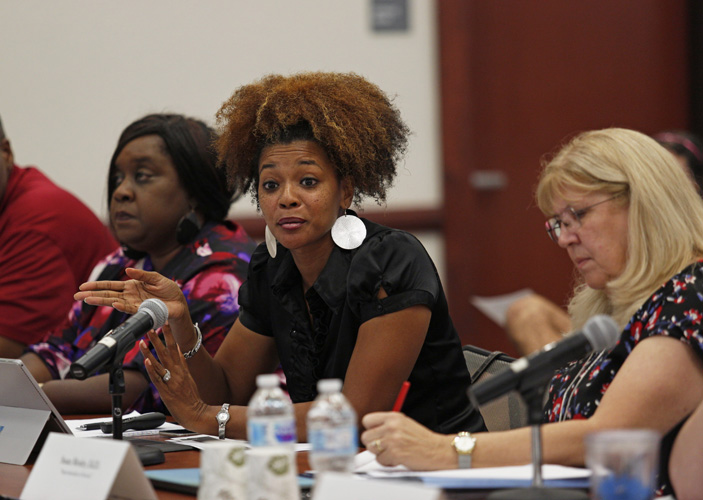
The Indian River County School Board says it will begin developing a plan this month – possibility including busing students to different schools than the ones they now attend – to comply with a 52-year-old federal desegregation order.
The board made that promise to the NAACP during a special meeting on Oct. 30.
“We know there’s work to be done,” Board Chairman Laura Zorc told NAACP members. “We’re ready to roll up our sleeves and get to work.”
The dramatic change of heart comes after years in which the school district fought the NAACP in court to try and get out from under the federal order, claiming that it had complied or was complying with key elements of the plan.
At a nearly four-hour-long meeting last week, the two sides reviewed and discussed a report released by the district’s Equity Committee that gave the district failing marks for its efforts to recruit, hire and retain more African-American teachers and adequately address the needs of African-American students, who consistently perform far below their white classmates.
The School Board did not dispute any of the findings in the Equity Committee’s report. Instead board members used the meeting to seek additional input from the NAACP and Equity Committee.
Among other things, the board agreed to an Equity Committee recommendation that the district set an initial goal of making sure there are at least five teachers of African-American descent at each school building.
The School Board also revived a committee recommendation that the district consider rezoning portions of the district to ensure that schools have a more racially diverse population.
Merchon Green, the Equity Committee’s chairwoman, shared the district’s own data that shows student populations at several schools have become increasingly segregated – most notably Dodgertown and Gifford Middle School, which have predominately African-American enrollment.
Board Vice-Chairman Tiffany Justice expressed concern that busing more students would be costly and create discomfort among some parents. But her views weren’t shared by others at the meeting.
“Yes, it would be costly,” board member Teri Barenborg responded. “But I think it’s a very fair thing to do.”
Interim Superintendent Susan Moxley said she has already directed her staff to look at the possibility of providing busing for students whose parents may not be in a position to transport them to different schools.
“We still need to study the cost,” Moxley said. “It’s not an easy problem to fix.”
Green noted that in 1967, districts throughout the country started to bus students to different schools to try and desegregate certain schools.
“We need to go back to doing it to ensure there is diversity in our schools,” said Green, who acknowledged implementing the plan would be a major challenge for the district. “It’s not the committee’s role to figure out how to do it. It’s the district’s responsibility to become compliant [with the federal order].”
The Equity Committee gave the school district passing grades in the areas of transportation and extra-curricular activities, but noted some concerns that the board agreed to look into.
For example, the NAACP has collected numerous complaints that very few African-American students make the Varsity Cheerleading Squad at Vero Beach High School, NAACP President Tony Brown said.
The problem is most African-American students are not aware of an unwritten rule at the school that requires students to enroll in expensive tumbling classes prior to cheerleading tryouts. Many African-American students can’t afford the tumbling training, Brown said.
A similar problem exists in lacrosse – students can’t afford the equipment required to participate in the sport, Brown said.
Moxley said she would direct her staff to look into the concerns.
The School Board, NAACP and Equity Committee will spend the next two weeks finalizing an initial progress report that must be submitted to a federal judge by the end of December. An annual progress report is one of several requirements the district must comply with as part of a court settlement with the NAACP.
The NAACP four years ago filed a lawsuit to force the district to comply with the federal desegregation order that dates from the 1960s. Former Superintendent Mark Rendell and his board spent more than $750,000 of taxpayer money fighting the NAACP and trying to get the court to release the district from the federal order.
Moxley and the current board have adopted a new attitude and shown a willingness to correct problems identified by the desegregation order.
“This feels like a new day,” a cautiously-optimistic Brown said. “The board and NAACP need to have a continuing dialogue to see what is and isn’t working.”



